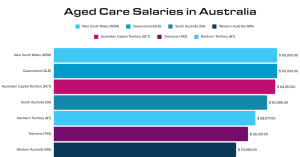Lots of people are choosing to work in aged care. No wonder, when the industry continues to expand quickly and support the many thousands of Australians in need of daily support.
It can be a hugely rewarding field of work in many ways – personally as well as financially. But how much do Aged Care Workers get paid today? If you’re considering working in this sector, it’s important to know what salary you can expect once you’re trained and ready.
In this article, we explore Aged Care Worker wages and what it takes to become one, helping you decide if it’s the right role for you.
What is an Aged Care Worker?
Australian government figures show that a staggering 40% of older people living with their family or in permanent care need daily support. Consequently, the demand for workers to help look after them has risen significantly in recent years and continues to do so, with 5% growth year on year.
An Aged Care Worker provides this essential support and care, assisting older adults with daily tasks, activities and medication management. Some continue to live in their homes and receive support from one or more care workers through regular visits; others who require consistent care move into a full-time care facility and receive support from an in-house care team.
Key Responsibilities of an Aged Care Worker
Since the needs of individuals change from one to the next, care workers cover a range of duties from one day to the next. Below are some of the responsibilities you can expect as an Aged Care Worker:
- Daily personal care – bathing, dressing, grooming, and toileting
- Mobility support
- Meal preparation and feeding
- Housekeeping
- Health monitoring
- Basic medical care
- Social activities
- Companionship
Some adults will require more specialist care due to having a condition like dementia or Alzheimer’s, or as they approach the end of life.
How Much Can an Aged Care Worker Earn?
Across Australia, Aged Care Worker pay rates differ for several reasons, one being the work environment and whether the care takes place in a private residential facility or a person’s own home. There are several factors which influence pay rates for home workers versus facility-based workers, as follows:

Residential Care Home Worker Salaries
Working in a residential care home might offer more stable hours and benefits, potentially leading to a slightly higher average pay due to the structured environment and additional responsibilities like coordinating with other healthcare professionals and managing multiple residents.
In-home Care Work Salaries
Providing care in a person’s own home might offer less stability in hours and benefits but can sometimes result in higher hourly wages due to the personalised, one-on-one nature of the care. However, this can vary widely depending on the employer and specific job requirements.
As you can see, these differences make it a challenge to pinpoint a precise salary – alongside other factors like a worker’s years of experience, which can warrant a higher salary than a new starter. It’s why many online job sites like Seek provide a salary range for roles like Aged Care Worker.
According to Talent, one of Australia’s leading job sites, the average salary of an Aged Care Worker in 2024 is approximately $64k per year (just over $1200 per week). This figure draws from over 260 positions on their site and gives a good indication of what you might expect to earn when working in this role, based on factors already mentioned – like the type of care work, location, and previous work experience.
Another great resource when researching salaries is the Jobs and Skills Atlas. This government page provides lots of information on industries like the Aged Care and Disability sectors, including job-specific information like the median weekly wage, total numbers employed and projected sector growth. According to them, a median salary for Aged and Disabled Carers is more like $1600 per week – higher than the figures reported by Talent (although it’s important to remember some Disability Worker jobs pay a high salary, which may pull this median figure above what’s typical in the Aged Care sector).
Note that there is a national aged care minimum wage in Australia. Set by the Fair Work Commission in 2024, the minimum Certificate III (Aged Care) pay rate is $32.21 per hour for all care workers employed in a residential facility.
Aged Care Worker Salary by State
If you’re wondering whether Aged Care Worker salaries are different across Australia, the answer is yes. Some states have a denser population, and the number of older people increases, meaning the demand for care workers rises along with it – as does the salary. For example, an average Aged Care Worker salary in Queensland is around $65k per year, and only $56k per year in Tasmania.
- New South Wales (NSW): $65,000 per year
- Queensland (QLD): $64,457 per year
- South Australia (SA): $62,086 per year
- Western Australia (WA): $53,060 per year
- Australian Capital Territory (ACT): $64,457 per year
- Tasmania (TAS): $56,531 per year for entry-level positions
- Northern Territory (NT): $58,677 per year

How to Get Started in Aged Care Work
Aged Care Worker Qualifications
It is a big responsibility to care for older people, not to mention physically and mentally challenging. As such, you will need to complete a formal qualification before working in the aged care sector.
The most suitable training course to gain the skills necessary for supporting older people in their homes or in a care home is the CHC33021 Certificate III in Individual Support (Ageing).
This popular course teaches students a range of practical skills to support older people effectively. It includes 15 units of study, covering a wide range of topics like how to tailor care to individual needs, safe work practices and supporting well-being. Training also includes content specific to those caring for older adults, like supporting people with a chronic disease, how to prevent falls and delivering care using a palliative approach.
The course typically takes less than twelve months to complete, after which, students are ready for work in this sector. Alternatively, they can continue with further study such as the CHC33021 Certificate IV in Ageing Support.
Personal qualities
Aside from completing formal training, you need various soft skills to work with older adults – the key ones being reliability, flexibility and patience. Communication skills are also necessary in this sector, to deal effectively with clients, their families and other health professionals. You also need the ability to work well as part of a team and independently.
Ready for Aged Care Work?
Working with older adults comes with many benefits, not least a respectable salary. With the sector growing year-on-year and the recent aged care pay rise, you can expect plenty of work opportunities today and ongoing, setting you up well for a long and richly rewarding career.
If you’re still to train, why not begin your journey into aged care by completing the CHC33021 Certificate III in Individual Support (Ageing) at Collaboration Learning. We offer flexible learning, expert tuition, and most students are fully trained in less than a year!





